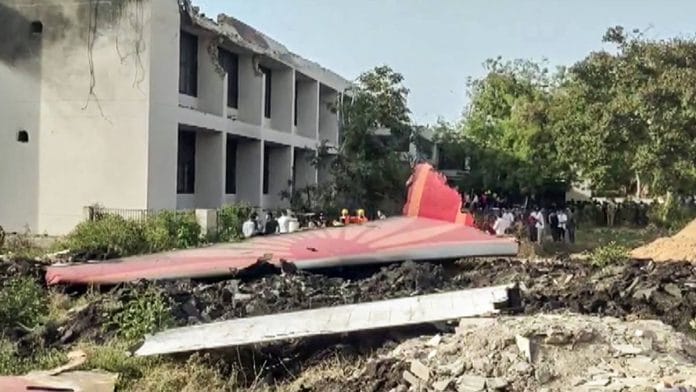New Delhi: The Federation of Indian Pilots (FIP), a nationwide body of pilots, has sent legal notices to international media platforms, the Wall Street Journal (WSJ) and Reuters, accusing them of not basing their reports on facts while highlighting Aircraft Accident Investigation Bureau’s (AAIB) preliminary report on the AI-171 plane crash.
The controversy has come close on the heels of reports by a few US-based publications alleging that action by one of the pilots was most likely the cause of the crash.
Criticising the WSJ and Reuters, Federation of Indian Pilots (FIP) President, Captain CS Randhawa said that their news reports were “misleading” and factually incorrect.
The Air India Flight AI-171, a Boeing 787 Dreamliner en route from Ahmedabad to London had crashed shortly after takeoff on 12 June, killing 260.
The head of the US National Transportation Safety Board (NTSB), Jennifer Homendy, said 19 July that the media reports surrounding the probable causes of the air crash were “premature and speculative”.
“India’s Aircraft Accident Investigation Bureau just released its preliminary report. Investigations of this magnitude take time. We fully support the AAIB’s public appeal, which was released Thursday, and will continue to support its ongoing investigation. All investigative questions should be addressed to the AAIB,” Homendy said in a statement.
Speaking to ThePrint, Randhawa accused the media organisations of conducting a “private investigation” into the matter and asked, “How did they do this when the NTSB (National Transportation Safety Board) clearly asked the media to focus on the details given in the AAIB’s report?”
Regarding the legal notices sent to the media organisations, Randhawa told ThePrint that the FIP has received a response from WSJ and his legal team is soon going to respond to it. “I cannot share the details of the response for now but all the details will be out in the due course of time,” he said.
Earlier, speaking to ANI, Randhawa said that NTSB’s statement will put all speculations to rest on “blaming Indian pilots”.
He also said that the WSJ is to be blamed for “misleading” the public. “…they come out with their own conclusions. Are they the investigative body? They’re saying all this rubbish around the world. They are not the investigative body, and the reports are not based on any factual content, which is mentioned in the preliminary report. So, how can they jump to conclusions and give press statements around the world?” he told ANI.
Randhawa said that FIP has initiated legal action against the media organisation, and in the notices shared with them, the organisation has asked for an explanation and an official apology. “If they don’t, then we will take further action based on lawyers’ advice,” he said.
WSJ report revelations
A Wall Street Journal report published on 17 July, citing sources close to the investigation, claimed that cockpit voice recordings from AI-171 indicated a critical moment shortly after takeoff on 12 June, when fuel to both engines was cut off mid-air and that the recording suggested that it was the captain who flipped the switches controlling the fuel supply.
The WSJ report also claimed that the voice recordings indicated the pilots’ emotional states, with the first officer reportedly reacting with shock and panic, while the captain remained calm, something the report claimed shed light on decision-making during the final moments of the flight.
The preliminary report by India’s Aircraft Accident Investigation Bureau (AAIB) notes that the fuel switches were flipped within a second of each other and turned back on just 10 seconds later. This sequence has raised questions about whether the action was accidental or deliberate. US officials, according to the WSJ, are now exploring the possibility of a criminal case, even as the official cause remains undetermined.
While the AAIB’s preliminary report has not named any pilot responsible for flipping the fuel switches, the sources cited by the WSJ in the report say, “Details in the preliminary report also suggest it was the captain who turned off the switches, according to people familiar with the matter, US pilots and safety experts tracking the probe.”
(Edited by Viny Mishra)






